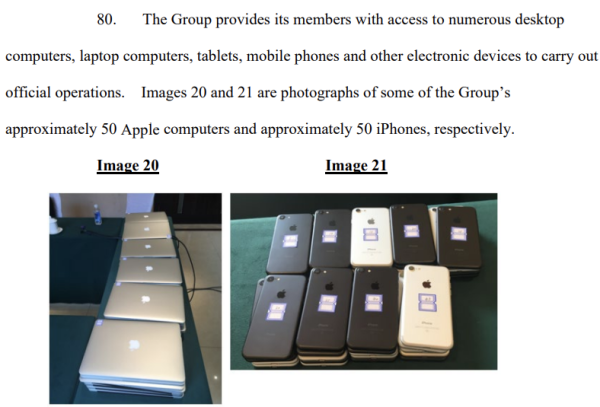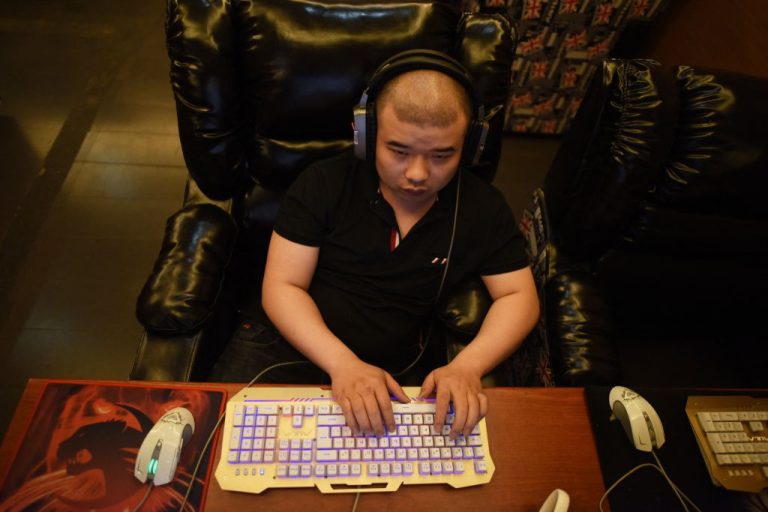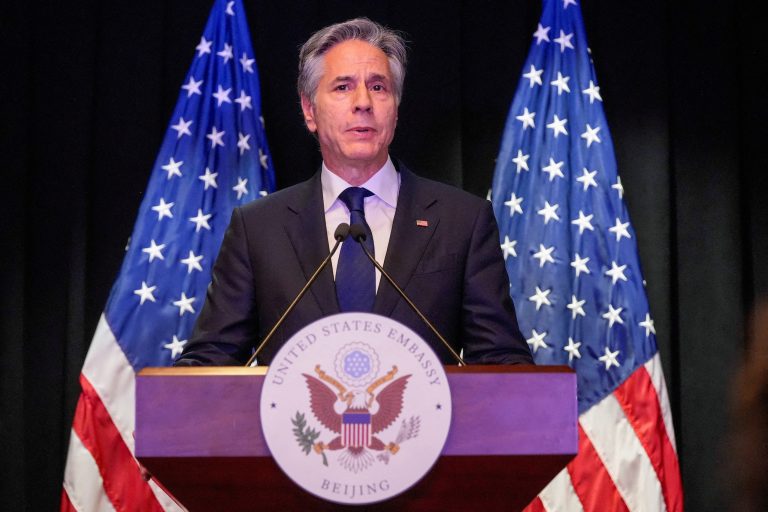The United States Department of Justice has charged 34 members of the Communist Chinese Ministry of Public Security (MPS), alleging that a key unit of the ruling Chinese Communist Party’s counterintelligence and political security operations engaged in a long term systematic campaign of online brigading and intimidation against dissidents.
In an April 17 Press Release announcing the charges in the Federal Court system of the Eastern District of New York, U.S. Attorney for the District, Breon Peace, stated that the current government of China had deployed “an elite task force of its national police” dubbed the “912 Special Project Working Group.”
Peace stated that the 912 had served “as a troll farm to attack Chinese dissidents in our country for exercising free speech in a manner that the PRC government disfavors, and spread disinformation and propaganda to sow divisions within the United States.”
Specific examples of content the ruling Communist Party disfavors are described in the 89-page pleadings as ranging “from discussions about the overthrow of the CCP’s control of the PRC government and the statuses of the Hong Kong Special Administrative Region and the Republic of China—commonly referred to as Taiwan—to remarks on CCP General Secretary Xi Jinping’s apparent resemblance to the fictional cartoon character Winnie the Pooh.”
Filings also comment that there are “Five Poisons” that are “especially sensitive topics to the CCP: “Uighurs, Tibetans, adherents of Falun Gong spiritual practice, pro-democracy dissidents, and advocates for the independence of the Taiwan.”
Success
You are now signed up for our newsletter
Success
Check your email to complete sign up
The case is compiled and signed by FBI Special Agent Joseph Hugdahl and are especially distinct in that they systematically chronicle both the structure and inner workings and even the day to day internet activities of the 912, which are alleged to have relied on a series of Apple computers and iPhones marked with Chinese government security classification.

The FBI alleges that the MPS organized extensively to create a large brigade of fake accounts, often using western names and profile images, which “often purport to belong to authentic individual users, and unlike the official social media accounts of PRC government agencies and officials, conceal from social media services and U.S. users that their content is posted on behalf of the PRC government.”
RELATED READING
- How the Pentagon Handles a ‘Clandestine Army’ of Ground Agents and Online Influencers ‘Ten Times the Size’ of the CIA
- Post Office Law Enforcement Arm Being Used to Surveil Internet for Right-Wing Content
- Biden Admin ‘Very Angry’ Twitter Wasn’t Doing Enough to Push COVID Narratives
“Some of these social media accounts are created to give the appearance that they are controlled by U.S.-based users, and, in certain instances, communicate directly with U.S. users about subjects of interest to the PRC government and the CCP,” the filings allege.
The DOJ argues in its case that, “This practice gives users of the social media platforms the false impression that multiple U.S. persons unaffiliated with the PRC government agree with narratives generated by the PRC government about a variety of topics, and disagree with the publicly held views of PRC dissidents on issues such as the COVID-19 pandemic, the advantages of democracy over autocracy, U.S. domestic and foreign policy, human rights issues in Hong Kong and Xinjiang Province, Taiwan, and the Russian invasion of Ukraine.”
The filings argue that, “By hiding the PRC-government affiliation of the Group’s accounts” that the 912’s members “seek to influence and manipulate online discourse, including discourse in the United States, toward positions favored by the PRC government and the CCP.”
Not only has the 912 created a brigade of fake accounts to spread its narrative, the Justice Department alleges that the organization also sought to “recruit U.S. persons to act as unwitting agents” of the current Chinese government.
The 912 is not a lone wolf, the filings state. The group coordinated with officials in the notorious United Front Work Department foreign influence campaign hub and even members of the CCP’s Central Committee.
Filings also allege that based on “internal records and communications of the Group” that the 912, which operates on mainland China’s soil, “Has developed and uses various practices and procedures for targeting individuals, including those residing in the United States, and for propagating PRC official statements through misattributed accounts.”
The Justice Department calculated the number of accounts created and maintained by the regime to operate its campaign in the “thousands,” noting that the puppets “to the public, appear to be used by unique users located around the world, including in the United States.”
In order to make their strawmen look more convincing to the uninitiated, the DOJ alleges the 912 joins “Western religious groups, such as the Facebook groups ‘Jesus Is the Light Of The World,’ ‘Bible Daily,’ ‘I love GOD & Jesus our Saviour. Join,’ and ‘Honest Quotes.’”
“Other accounts have joined Facebook groups dedicated to pop culture and/or more mundane topics, such as ‘Movies FAN or ‘Cramps’,” they add.
The FBI investigation found, the filings allege, that once a 912 agent creates content, officers of the group “circulate internal notifications of the postings to alert others of the need to support, like, retweet and share the content through other Group accounts.”
Chat features inside of social media platforms were heavily used to coordinate the activity.
But not only did the 912 run a general campaign to proliferate narratives congruent with the CCP’s culture while whitewashing and astroturfing publicity damaging to the Party’s image, it also harassed “PRC dissidents and critics of the PRC government.”
Filings state the 912 harassed this group “by posting threatening or delegitimizing content regarding such persons,” and that, “Group members also take affirmative action to have online meetings and accounts associated with PRC critics or dissidents removed from U.S. social media platforms.”
In total, the filings chronicle the harassment and intimidation of a total of 14 anonymized “Victims” who operated a variety of public groups and events with themes ranging from general anti-communism to Hong Kong democracy and independence to Tiananmen Square Massacre memorial campaigns.
One of the most prominent instances included in the filings against the Ministry of Public Security included a set of charges unsealed in December of 2020 against a man named Jin Xinjiang, aka Julien Jin, who appears to have been an employee of Hangzhou offices of the California-headquartered video conferencing platform Zoom.
Jin is alleged to have used his position as a company administrator, along with employees located in the United States, to not only collect “account information, including the account holder name, the user ID, account ID, account number and meeting history” and the “true name and email account” of a target who organized a May 31, 2020 Tiananmen Square Massacre awareness event.
The target was also permanently banned from the platform.
Moreover, the FBI alleges that U.S.-based employees sent Jin “multiple documents containing the names, associated email accounts and IP addresses used by all participants in the May 31 Meeting, including users who joined from IP addresses in the United States.”
A same day Press Release issued by the Department of Justice announced that the complaint against Jin had been amended to include charges against 10 individuals, including employees of the MPS and two officials of the Cyberspace Administration of China, “with conspiracy to commit interstate harassment and unlawful conspiracy to transfer means of identification.”
The release notes, “Nine of the defendants are believed to reside in the PRC and remain at large. The tenth defendant is believed to reside in Indonesia or the PRC and also remains at large.”
In the case against the 34 MPS members, the filings state that the online brigading is not limited to mere harassment. Instead, 912 members “identify online users to other PRC law enforcement agents,” who then go and threaten and intimidate friends and family located in the mainland.
The DOJ characterizes the purpose as to “attempt to dissuade further critical postings through intimidation.”
Activities used against the May 31 meeting participants were described as having “caused severe stress and underscored the ability of the PRC government to undermine the participants’ physical safety in the United States.”
Victims interviewed by the FBI were said to have “shared…their feeling of being persecuted even in the United States by the PRC government, as well as a feeling of helplessness in their inability to use the service of a U.S. Internet service provider without fear of retribution from the MPS and MSS.”
















